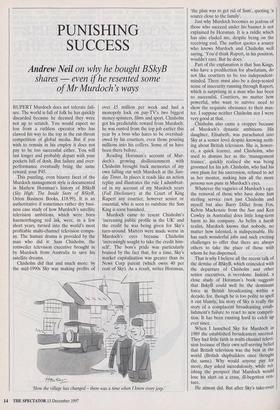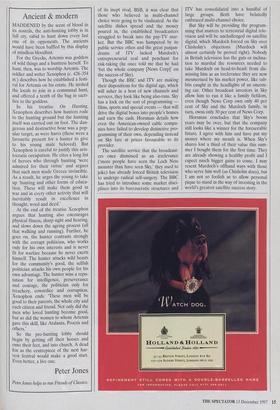PUNISHING SUCCESS
Andrew Neil on why he bought BSkyB
shares — even if he resented some of Mr Murdoch's ways
RUPERT Murdoch does not tolerate fail- ure. The world is full of folk he has quickly discarded because he deemed they were not up to scratch. You would expect no less from a ruthless operator who has clawed his way to the top in the cut-throat competition of global media. But if you wish to remain in his employ it does not pay to be too successful either. You will last longer and probably depart with your pockets full of dosh. But failure and over- performance eventually bring the same reward: your P45.
This puzzling, even bizarre facet of the Murdoch management style is documented in Mathew Horsman's history of BSkyB (Sky High: The Inside Story of BSkyB, Orion Business Books, £18.99). It is an authoritative if sometimes rather dry busi- ness case study of how Murdoch's satellite television ambitions, which were born haemorrhaging red ink, were, in a few short years, turned into the world's most profitable multi-channel television compa- ny. The human drama is provided by the man who did it: Sam Chisholm, the rottweiler television executive brought in by Murdoch from Australia to save his satellite dreams.
Chisholm did that and much more: by the mid-1990s Sky was making profits of
MN/
over £5 million per week and had a monopoly lock on pay-TV's two biggest money-spinners, films and sport. Chisholm got his predictable reward from Murdoch: he was ousted from the top job earlier this year by a boss who hates to be overshad- owed by his courtiers, even those pouring millions into his coffers. Some of us have been there before.
Reading Horsman's account of Mur- doch's growing disillusionment with Chisholm brought back memories of my own falling out with Murdoch at the Sun- day Times. In places it reads like an action replay and illustrates the rule I adumbrat- ed in my account of my Murdoch years (Full Disclosure): at the Court of King Rupert any courtier, however senior or essential, who is seen to outshine the Sun King is soon banished.
Murdoch came to resent Chisholm's 'increasing public profile in the UK' and the credit he was being given for Sky's turn-around. Matters were made worse in Murdoch's eyes because Chisholm 'increasingly sought to take the credit him- self. The boss's pride was particularly bruised by the fact that, for a time, Sky's market capitalisation was greater than its News Corp parent (which owns 40 per cent of Sky). As a result, writes Horsman, 'How the the village has changed — there was a time when I knew every jeep.' 'the plan was to get rid of Sam', quoting 'a source close to the family'.
Just why Murdoch becomes so jealous of those who succeed under his banner is not explained by Horsman. It is a riddle which has also eluded me, despite being on the receiving end. The author quotes a source who knows Murdoch and Chisholm well saying, 'You'd think Rupert, in his position, wouldn't care. But he does.'
Part of the explanation is that Sun Kings, who have a predilection for absolutism, do not like courtiers to be too independent- minded. There must also be a deep-seated sense of insecurity running through Rupert, which is surprising in a man who has been so successful. Courtiers, no matter how powerful, who want to survive need to show the requisite obeisance to their mas- ter. I suppose neither Chisholm nor I were very good at that.
Chisholm also came a cropper because of Murdoch's dynastic ambitions. His daughter, Elisabeth, was parachuted into Sky at a senior level despite knowing noth- ing about British television. She is, howev- er, a quick learner, and Chisholm, who used to dismiss her as the 'management trainee', quickly realised she was being groomed for his job. Chisholm, who had his own plans for his succession, refused to act as her mentor, making him all the more persona non grata in Murdoch's eyes.
Whatever the vagaries of Murdoch's ego, the removal of those who have done him sterling service (not just Chisholm and myself but also Barry Diller from Fox, Kelvin Mackenzie from the Sun and Ken Cowley in Australia) does little long-term harm to his company. As befits a harsh realist, Murdoch knows that nobody, no matter how talented, is indispensable. He has such wonderful jobs and such exciting challenges to offer that there are always others to take the place of those with whom he has dispensed.
That is why I believe all the recent talk of the demise of BSkyB, which coincided with the departure of Chisholm and other senior executives, is overdone. Indeed, a close study of Horsman's book suggests that BskyB could well be the dominant force in British broadcasting within a decade, for, though he is too polite to spell it out bluntly, his story of Sky is really the story of a complacent broadcasting estab- lishment's failure to react to new competi- tion. It has been running hard to catch up ever since.
When I launched Sky for Murdoch in 1989 the established broadcasters sneered. They had little faith in multi-channel televi- sion because of their own self-serving belief that British television was the best in the world (British shipbuilders once thought the same). Why would anyone pay for more, they asked incredulously, while rel- ishing the prospect that Murdoch would lose his shirt on a crass, ill-begotten ven- ture.
He almost did. But after Sky's take-over of its inept rival, BSB, it was clear that those who believed in multi-channel choice were going to be vindicated. As the satellite dishes spread and the money poured in, the established broadcasters struggled to break into the pay-TV mar- ket. But the BBC was hampered by its public service ethos and the great panjan- drums of ITV lacked Murdoch's entrepreneurial zeal and penchant for risk-taking (he once told me that he had 'bet the whole company [News Corp]' on the success of Sky).
Though the BBC and ITV are making their dispositions for the digital age, which will usher in a host of new channels and services, they look like being also-rans. Sky has a lock on the sort of programming — films, sports and special events — that will drive the digital boxes into people's homes and earn the cash. Horsman details how even the American-owned cable compa- nies have failed to develop distinctive pro- gramming of their own, depending instead on Sky fare at prices favourable to its provider.
The satellite service that the broadcast- ers once dismissed as an irrelevance ('more people have seen the Loch Ness monster than have seen Sky,' they used to joke) has already forced British television to undergo radical self-surgery. The BBC has tried to introduce some market disci- plines into its bureaucratic structures and ITV has consolidated into a handful of large groups. Both have belatedly embraced multi-channel choice.
But Sky will be providing the program- ming that matters to terrestrial digital tele- vision and will be unchallenged on satellite digital, which Murdoch forced on Sky over Chisholm's objections (Murdoch will almost certainly be proved right). Nobody in British television has the guts or inclina- tion to marshal the resources needed to take Murdoch on head-to-head: from dis- missing him as an irrelevance they are now mesmerised by his market power, like rab- bits caught in the headlights of an oncom- ing car. Other broadcast investors in Sky allow him to run it like a family fiefdom, even though News Corp own only 40 per cent of Sky and the Murdoch family, in turn, owns only 30 per cent of News Corp.
Horsman concludes that Sky's boom years may be over, but that the company still looks like a winner for the foreseeable future. I agree with him and have put my money where my mouth is. When Sky's shares lost a third of their value this sum- mer I bought them for the first time. They are already showing a healthy profit and I expect much bigger gains to come. I may resent Murdoch's offhand ways with those who serve him well (as Chisholm does), but I am not so foolish as to allow personal pique to stand in the way of investing in the world's greatest satellite success story.



















































































 Previous page
Previous page